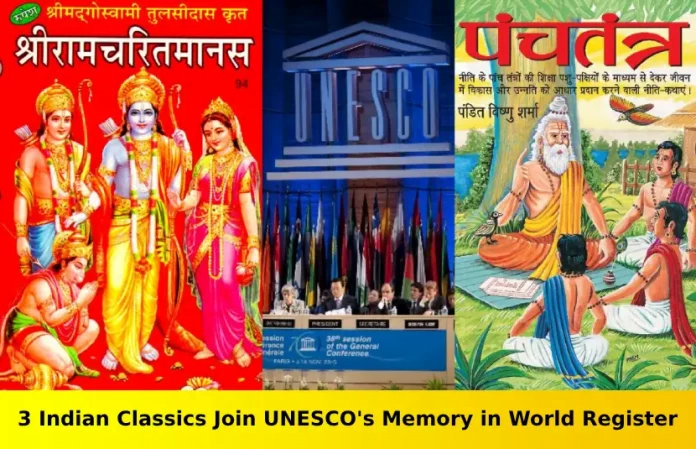
In a remarkable achievement, India has seen three of its literary masterpieces—Ramcharitmanas, Panchatantra, and Sahṛdayāloka-Locana—honored with a place in UNESCO’s Memory of the World Asia-Pacific Regional Register. This prestigious recognition not only brings immense pride to the nation but also underscores India’s rich cultural heritage and literary wealth.
Literary Giants and Their Timeless Works
Authored by revered figures such as Goswami Tulsidas, Pandit Vishnu Sharma, and Acharya Anandvardhan, these works are pillars of Indian literature, each contributing uniquely to the cultural and intellectual tapestry of the country.
Ramcharitmanas
Penned by Goswami Tulsidas, the Ramcharitmanas offers an intricate narrative of the life and teachings of Lord Rama, a revered figure in Hindu mythology. This epic poem is not only a religious text but also a literary masterpiece that has inspired devotion and imparted moral values for centuries. Its lyrical beauty and profound lessons continue to resonate, making it a timeless work that bridges generations.
Panchatantra
The Panchatantra, written by Pandit Vishnu Sharma, is a collection of ancient Indian fables that have delighted and instructed readers for centuries. These tales, rich with wisdom and moral teachings, use animal characters to impart lessons about human behavior and ethics. The Panchatantra’s universal themes and engaging storytelling ensure its relevance and popularity across cultures and eras.
Sahṛdayāloka-Locana
Crafted by Acharya Anandvardhan, Sahṛdayāloka-Locana is a work of profound philosophical and literary significance. Reflecting the intellectual depth of ancient Indian thought, this text explores aesthetics and the philosophy of literature, highlighting the sophisticated literary traditions of India.
Cultural Significance and Preservation
The inclusion of these literary treasures in UNESCO’s register highlights the importance of preserving diverse narratives and artistic expressions that transcend geographical and temporal boundaries. These works have indelibly shaped India’s cultural landscape and have had a global impact, demonstrating the universal appeal of their themes and messages.
The recognition was achieved through the collaborative efforts of various cultural institutions, particularly the Indira Gandhi National Centre for the Arts (IGNCA). Under the guidance of Professor Ramesh Chandra Gaur, IGNCA played a pivotal role in advocating for the inclusion of these masterpieces, showcasing India’s commitment to cultural preservation and the promotion of its literary heritage.
Impact on India’s Cultural Legacy
Beyond their artistic merit, these literary masterpieces have profoundly influenced India’s moral and cultural fabric. They have shaped the values and artistic expressions of countless generations, continuing to inspire and educate. Their inclusion in UNESCO’s register not only honors the creative genius of their authors but also reaffirms the timeless relevance of their teachings in promoting human values and understanding.
This recognition by UNESCO serves as a reminder of the enduring legacy of these works and the rich cultural heritage they represent. It is a moment of celebration for India, marking the global acknowledgment of its literary and cultural contributions to humanity.

